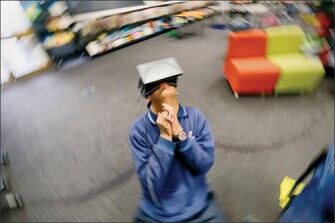
Facebook is providing virtual-reality kits to every high school in Arkansas.
Gov. Asa Hutchinson announced the expansion of his state’s Techstart partnership with the social media giant on Monday, calling it part of an ongoing effort to generate excitement for science and technology education.
“Facebook’s generous donation will provide Arkansas’ students with an exciting learning platform that will allow them to have fun while sharpening their computer science skills and exploring STEM careers,” Hutchinson said in a statement. “Students who utilize this incredible platform will be well-positioned to succeed in our increasingly technology-driven economy.”
Earlier this year, Facebook donated about 400 virtual-reality classroom kits—including computers, cameras, and Oculus Rift headsets—to roughly 250 Arkansas high schools. The new donation will expand that effort to include more than 550 kits to about 360 public high schools.
According to a press release from Hutchinson’s office, the Techstart program “uses a combination of virtual-reality instruction, curriculum support, and professional development for educators; access to computer-science events; and connections to engineering mentors.”
There’s certainly been no shortage of hype around the potential for virtual- and augmented-reality in the classroom. My colleagues over at Marketplace K-12, for example, recently wrote about an analysis by UK-based Futuresource Consulting predicting that “the number of students who access virtual-, augmented-, or mixed-reality through head-mounted displays will leap from 2.1 million in 2016 to nearly 83 million in 2021.”
But so far, at least, real reality hasn’t kept up.
Back in 2014, not long after Facebook acquired Oculus for a whopping $2 billion, Education Week wrote about how the technologies now being distributed in Arkansas were just the latest iteration of VR that proponents said would make a big splash in schools.
And just 5 percent of U.S. teachers say they are currently using AR or VR in their classrooms, according to a survey released last spring by the nonprofit group Project Tomorrow.
The Techstart partnership in Arkansas will be administered through the state education department’s computer science division, as well as the Arkansas Public Resource Center, a nonprofit membership organization that provides support, technical assistance, and training to the state’s schools.
Photo: Aaron Gonsalves, a student at the Jackson School, a school for special-needs students in Victoria, Australia, tries out the Oculus Rift virtual-reality system. --Luis Enrique Ascui/AP for Education Week
See also:
